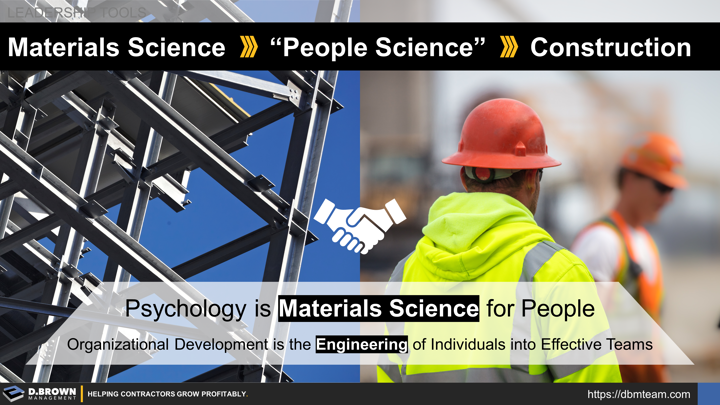You don't need to be an expert in materials science or engineering to be a construction contractor. Elements of both materials science and engineering are included in many craft apprenticeship programs as we must understand what we are installing. If you move into more alternative delivery methods including design-build and design-assist, you will have to build more capabilities in these areas.
That level of knowledge is what's required to build a project. Building projects is the foundation of being a contractor - it is our value-add.
As a construction business grows past the first couple stages, you will have to learn other technical skills at least at the foundational level, including law, accounting, taxes, and technology. You don't have to know these deeply, but you will have to understand the fundamentals enough to make effective decisions.
As the business grows past stage four, leadership at the top levels becomes more about the "People Science" aspects of the business including Organizational Development. This is not an administrative function that can be delegated but something that is core to ensuring your vision and strategic decisions at all levels are executed.
When you go to build a project, you can rely upon:
- Plans, Specs, and Contracts (Construction Docs) that have been built through the architectural process. Although not perfect, it generally delivers projects within about 10% of original bids.
- Building materials and systems that have been quality controlled in some way through a mechanism like Underwriters Laboratories (UL).
- Building codes that set guidelines for how those materials will get installed and an inspection process to ensure those guidelines are met.
- A standard process for construction management including submittals, RFIs, and changes that is enforced externally by the project owner, architect, owner's rep, and/or construction manager.
Building a construction business doesn't have anywhere close to those levels of design or controls. If you are interested in growing your construction business or career in general management, start studying and applying "People Science" (Organizational Development).
What was the last book you read on the principles of psychology and organizational development?
What are you doing with your team to help your emerging leaders develop these capabilities?
Sue Weiler-Doke understood this deeply which led her to get her master's in organizational psychology after spending a couple decades in leadership.
"All relationships begin with a simple conversation."

